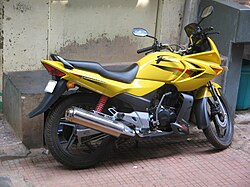Hero Honda Karizma R
 |
|
| Manufacturer | Hero Honda |
|---|---|
| Production | Since 2003 |
| Predecessor | HH Karizma |
| Successor | HH Karizma ZMR FI |
| Class | Sport touring motorcycle |
| Engine | 223 cc (13.6 cu in) air-cooled, four-stroke cycle, single, kick start / electric start |
| Transmission | 5-speed |
| Suspension | Front: Telescopic fork, 135 mm travel Rear: Swing arm |
| Brakes | Front: 276/260 mm (disc) Rear: 130/230 mm (Drum/Disc) |
| Tires | Front: 2.75x18 Rear: 100x18 |
| Wheelbase | 1,355 mm |
| Dimensions |
L: 2,125 mm W: 755 mm H: 1,160 mm |
| Related | Honda CRF230 |
The Hero Honda Karizma is a motorcycle manufactured in India by Hero Honda. It was launched in May 2003 and was given a cosmetic upgrade Karizma R in 2007. In September 2009, it was supplemented by another variant Karimza ZMR. Karizma got a refresh on 2014 with cosmetic and performance changes.
Karizma has been designed specifically for the Indian market. The styling is inspired by Honda VFR800. The instrument panel and the tank recesses are also designed keeping their functionality in mind. The horn has come under criticism for not being loud enough.
The sporty seating position is similar to Honda CBZ 125 F and BMW F650. Reviews have praised the handling of Karizma as "being easy for novice", "impeccable on straights and cornering" and as an "accomplished bike" in ride and handling. However the rear tyre, the handle bar and the foot pegs have been blamed in affecting the handling.
Karizma has the tried and tested, but slightly detuned version of 223 cc SOHC air-cooled engine from the CRF230 series of enduro/MX/supermoto bikes that are sold in the USA and South American markets. It has a five-speed gearbox in place of the CRF's six-speed. The engine is an all-aluminium, undersquare engine (bore 65.5 mm or 2.58 in and stroke 66.2 mm or 2.61 in) running a compression ratio of 9:1. It features a Kehlin CV carburettor with a CCVI switch. The top speed is around 130 km/h and the 0–60 km/h is achieved around 3.8 seconds. The Karizma is reported to have an overall fuel economy of 40 km/l (90 mpg or 2.4 l/100 km), with a best of 50 km/l (120 mpg) and a worst of 28 km/l (66 mpg).
...
Wikipedia
